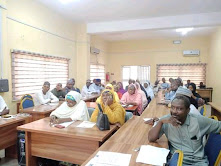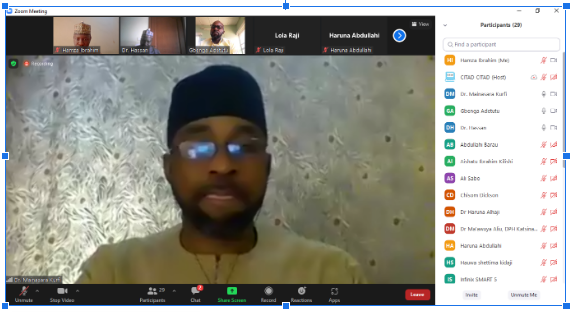
REPORT OF THE WORKSHOP FOR GUIDING AND COUNSELLING (G&C) OFFICERS OF SCIENCE AND TECHNICAL SCHOOLS BOARD, KANO STATE
By
Sagiru Ado Abubakar
As part of its contribution to support the school system to effectively guide and counsel
students, the Center for Information Technology and Development (CITAD) has on Tuesday,
April 19, 22 organized one-day workshop for Guiding and Counseling (G&C) officers of Science
and Technical Schools Board, Kano State. CITAD noted that the world is becoming complex and
advising young people for career prospects and trajectory is no longer easy. This is why career
counseling has to also change, become more heuristic and take into cognizance of the change
in work itself as well as the dynamics of the labor market at both micro and macro levels.
Giving his welcome remarks, Malam Yunusa Ya’u, Executive Director Center for Information
Technology and Development (CITAD) said that there is need guidance and counseling officers
of schools to continually be upgrading their skills in order to cope with the demand of their
tasks. He said that the workshop was organized to achieve the following objectives:
1. To introduce Guiding and Counseling (G&C) Officers to new developments in the area of
guidance and counseling
2. To update their skills and enhance their capacity in advising young students
3. To expose the participants to the use of technology for guidance and counseling that
will help them to carry out their task of guiding students better
The workshop took place at Hall B, CITAD Office, Kano and covered the following topics:
1. Labor Market Dynamics and Career Counseling of Young Students
2. Use of Technology in Career Counseling
3. Nurturing Creativity and Innovation in Young People
4. Pathways to Promoting Reading Culture among Students of Secondary Schools
Malam Kamaluddeen Umar, CITAD Technical Officer, said that his paper will look at some ICT
tools and platforms that can be used for guidance and cancelling for officers and students. He
explained that Information and Communication Technology (ICT) has become global tools in
solving almost all aspect of human activities in an efficient way, guidance and cancelling is not
left out in leveraging this ICT and its tools. In education sectors, lots of applications and
platforms have been used both by teachers and students to disseminate and acquire knowledge.
Guidance and Counselors Officers can conduct surveys to learn more about what students need
or expect when it comes to educational guidance. A school counselor can distributes surveys to
students at the beginning of the school year to learn how things are going at home, at school,
and with friends. He then gave the following Digital Survey Tools:
Send surveys, review your results and analyse charts and individual responses seamlessly
across your desktop, tablet, and phone.
JotForm : online form builder and survey builder that lets you create and fill forms &
surveys for data collection even when you are offline.
Nearpod: is instructional software that engages students with interactive learning
experiences. With Nearpod, students have the ability to participate in lessons that contain
virtual reality, 3D objects, PhET simulations and so much more. Interactive software
features empower student voice through activities like open ended questions within their
presentations, obtaining real-time data quickly.
While commenting on his paper, participants commented that when talking about technology
especially internet, teachers must seek for consent from both parent and ministry before they
allow their students to use internet. In rural areas where there is no internet connections to
use technology in guidance and counseling does not even arise. That’s the issue of access while
talking about affordability and availability of technological tools is another problem. They
forwarded their aforementioned challenges to the Science and Technical School Board, Kano
State.



